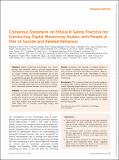Consensus Statement on Ethical & Safety Practices for Conducting Digital Monitoring Studies with People at Risk of Suicide and Related Behaviors
Author(s)
Nock, Matthew K; Kleiman, Evan M; Abraham, Melissa; Bentley, Kate H; Brent, David A; Buonopane, Ralph J; Castro‐Ramirez, Franckie; Cha, Christine B; Dempsey, Walter; Draper, John; Glenn, Catherine R; Harkavy‐Friedman, Jill; Hollander, Michael R; Huffman, Jeffrey C; Lee, Hye In S; Millner, Alexander J; Mou, David; Onnela, Jukka‐Pekka; Picard, Rosalind W.; Quay, Heather M; Rankin, Osiris; Sewards, Shannon; Torous, John; Wheelis, Joan; Whiteside, Ursula; Siegel, Galia; Ordóñez, Anna E; Pearson, Jane L; ... Show more Show less
DownloadPublished version (270.9Kb)
Publisher with Creative Commons License
Publisher with Creative Commons License
Creative Commons Attribution
Terms of use
Metadata
Show full item recordAbstract
OBJECTIVE: Digital monitoring technologies (e.g., smart-phones and wearable devices) provide unprecedented opportunities to study potentially harmful behaviors such as suicide, violence, and alcohol/substance use in real-time. The use of these new technologies has the potential to significantly advance the understanding, prediction, and prevention of these behaviors. However, such technologies also introduce myriad ethical and safety concerns, such as deciding when and how to intervene if a participant's responses indicate elevated risk during the study? METHODS: We used a modified Delphi process to develop a consensus among a diverse panel of experts on the ethical and safety practices for conducting digital monitoring studies with those at risk for suicide and related behaviors. Twenty-four experts including scientists, clinicians, ethicists, legal experts, and those with lived experience provided input into an iterative, multi-stage survey, and discussion process. RESULTS: Consensus was reached on multiple aspects of such studies, including: inclusion criteria, informed consent elements, technical and safety procedures, data review practices during the study, responding to various levels of participant risk in real-time, and data and safety monitoring. CONCLUSIONS: This consensus statement provides guidance for researchers, funding agencies, and institutional review boards regarding expert views on current best practices for conducting digital monitoring studies with those at risk for suicide-with relevance to the study of a range of other potentially harmful behaviors (e.g., alcohol/substance use and violence). This statement also highlights areas in which more data are needed before consensus can be reached regarding best ethical and safety practices for digital monitoring studies.
Date issued
2021Department
Program in Media Arts and Sciences (Massachusetts Institute of Technology)Journal
Psychiatric Research and Clinical Practice
Publisher
American Psychiatric Association Publishing
Citation
Nock, Matthew K, Kleiman, Evan M, Abraham, Melissa, Bentley, Kate H, Brent, David A et al. 2021. "Consensus Statement on Ethical & Safety Practices for Conducting Digital Monitoring Studies with People at Risk of Suicide and Related Behaviors." Psychiatric Research and Clinical Practice, 3 (2).
Version: Final published version